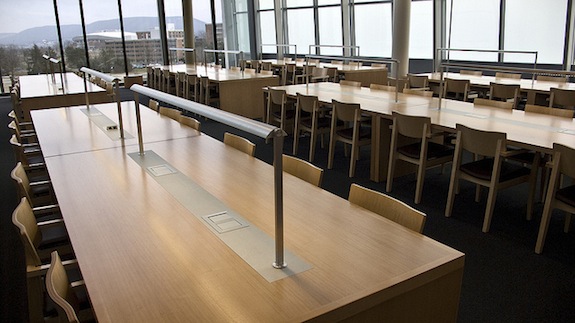When Discussing Personal Issues, People Like Bigger Rooms And Bigger Desks
People prefer big rooms and lots of space when discussing personal issues

Image: Penn State News
You’re about to confess to someone something really deep, dark and personal. But the room feels a little claustrophobic, and you’re a little too close to your confidant. So you chicken out.
Apparently, people prefer big rooms and lots of space when discussing personal issues. A new study asked 86 participants to talk to a female student in different set-ups, combining a little desk, a big desk, a little room and a big room. The questions the participants had to answer were personal—about sexuality, drug use and emotions. And they were filmed while talking. It turns out that those with the big desk in a big room felt much more at ease answering those questions, and more open to talking about the uncomfortable questions. This wasn’t just true based on the participants’ own perceptions, either. Research Digest explains:
Participants also behaved differently in the various physical situations. In the larger room, they leant forward more and had a more open posture. They leant on the larger desk more than they did on the small desk. In the larger room, they also made more eye contact at a large desk compared with a small desk.
But the big room and desk wasn’t the best predictor of how much participants shared. When talking about substance abuse, people talked more in the bigger room, regardless of desk size. But when it came to sexuality, it was the size of the desk that mattered.
These variables matter because adjusting them could help psychiatrists and therapists best set up their space in order to get people to feel comfortable and talk more. Of course, it’s not an exact science. The room size could have changed the interviewer’s techniques as well without her knowing it. And while participants liked the bigger rooms and desks better, the effect on their disclosure was far smaller than researchers had hoped. And, once again, this is a study done on undergraduate students, who aren’t always the best representatives of general human psychology.
More from Smithsonian.com:
/https://tf-cmsv2-smithsonianmag-media.s3.amazonaws.com/accounts/headshot/Rose-Eveleth-240.jpg)
/https://tf-cmsv2-smithsonianmag-media.s3.amazonaws.com/accounts/headshot/Rose-Eveleth-240.jpg)